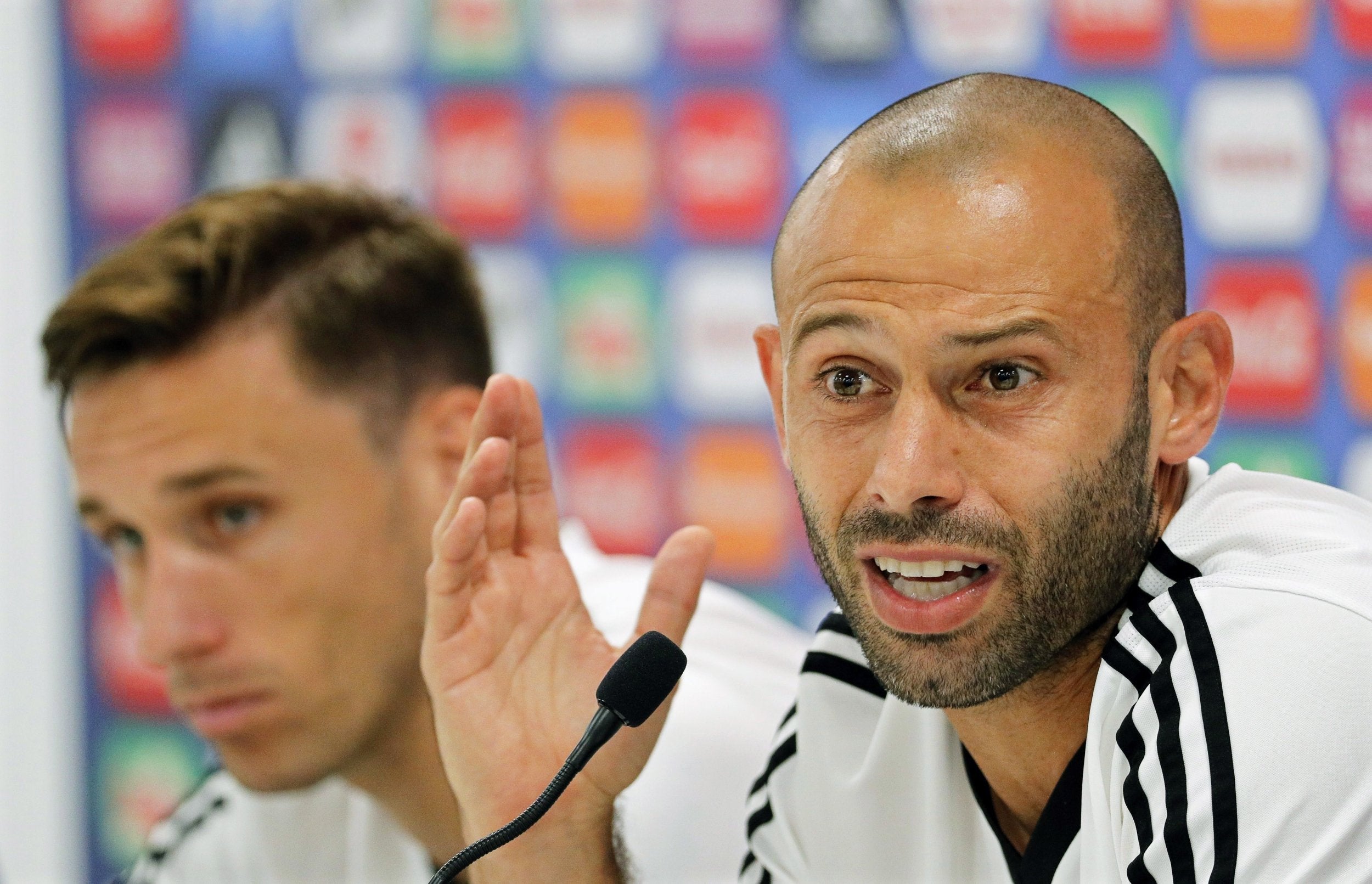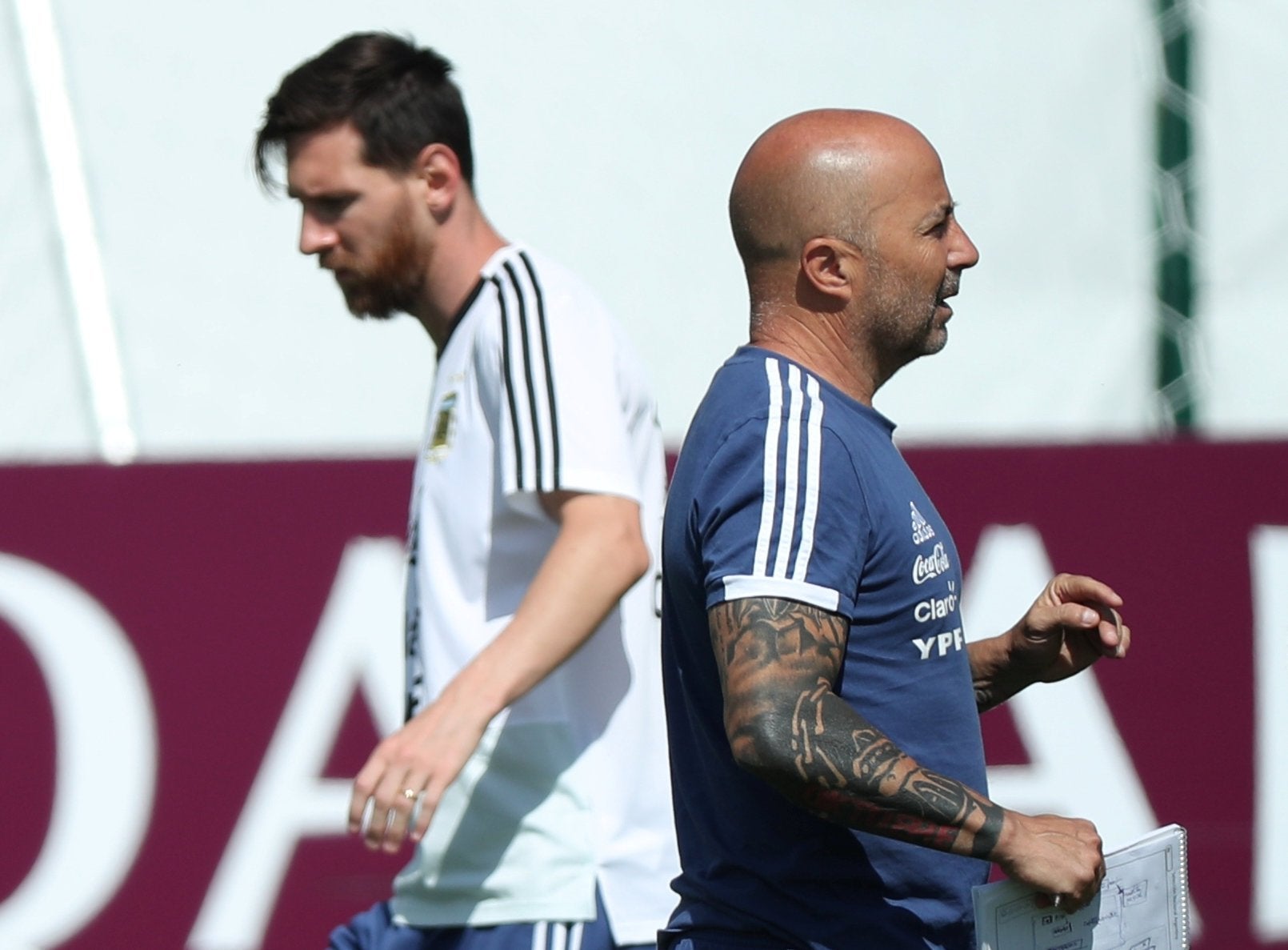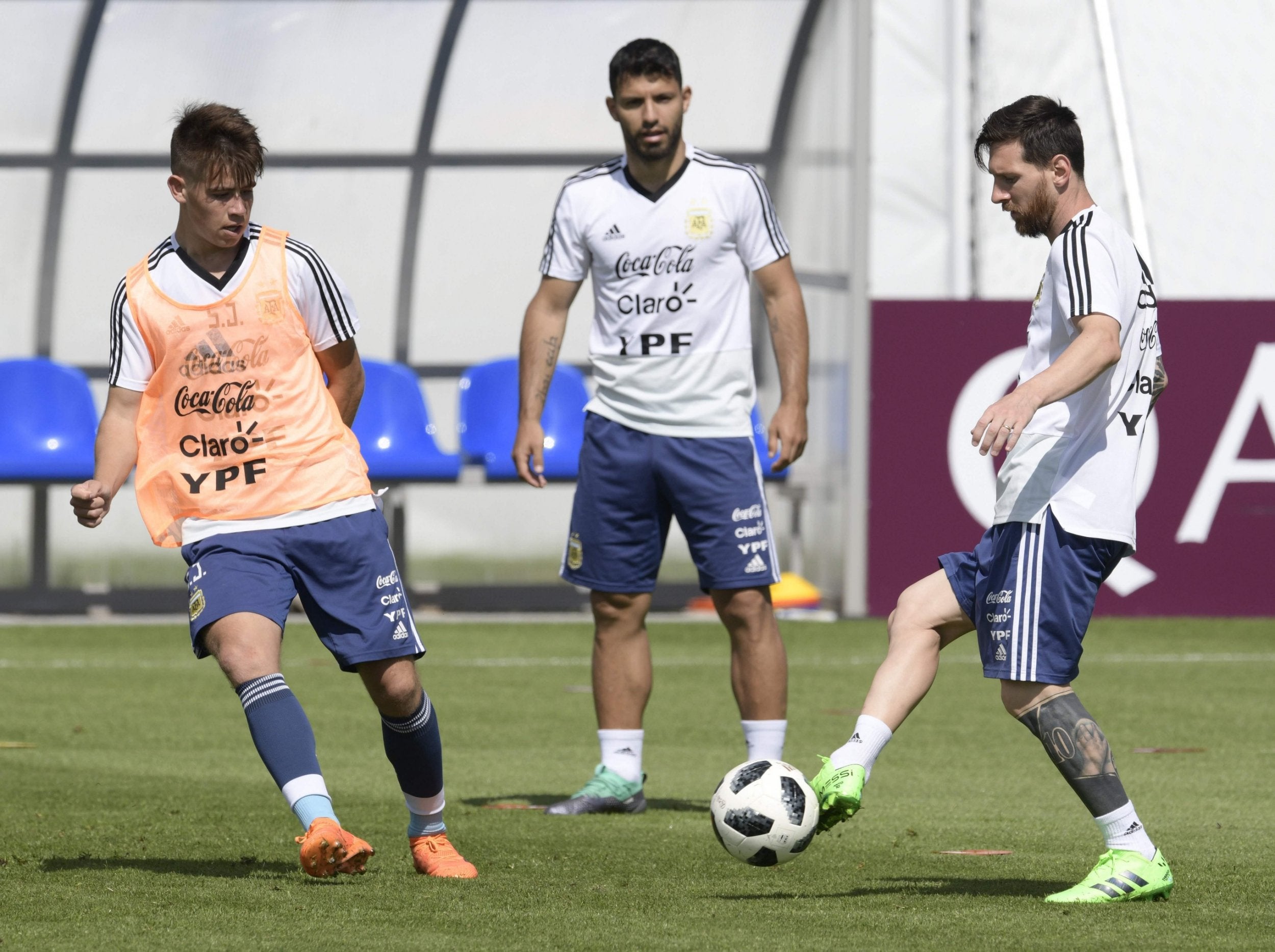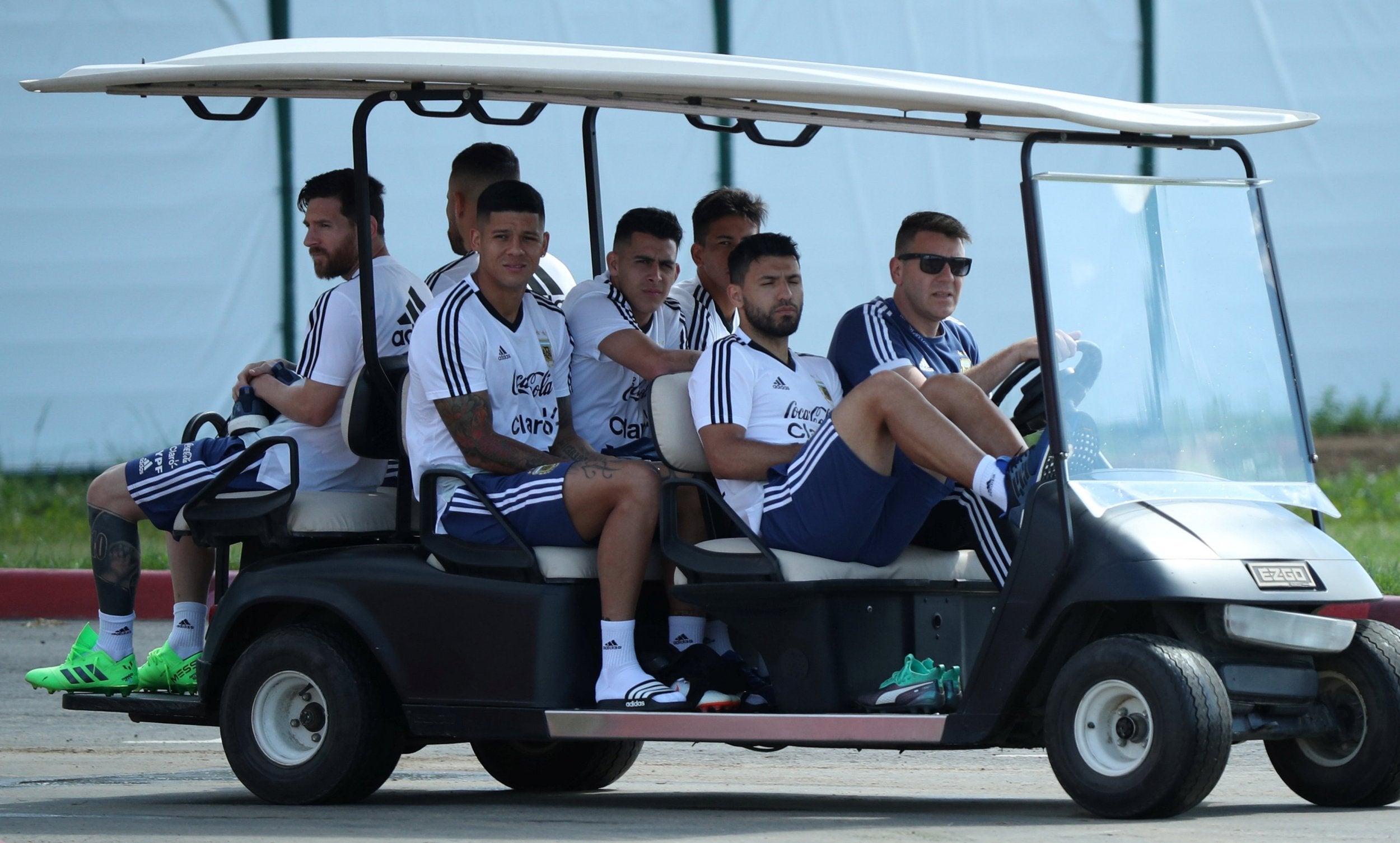The inside story of Argentina’s World Cup: Leaked WhatsApps, a 150kg cake and ‘going to the pineapples’ - how one wild weekend nearly derailed everything
In a story of politics and player revolt, infighting and backbiting, Argentina's tortured time in Russia could scarcely have gone worse
Bronnitsy is a small town around 40 miles south of Moscow that time passed by, boasting around 5,000 residents until the population - ahem - exploded to around 10,000 with the construction of the Old Ryzanskaya railway in the 1950s.
The rest of Russia had experienced its railroad boom nearly a century earlier, but Bronnitsy was a small settlement that during the 1600s had essentially been just a large set of stables to house 200 horses owned by Michael I - the first tsar of the Romanov dynasty - and animals are thought to have outnumbered humans there until the 20th century.
In short, there’s not a whole load going on in Bronnitsy. Or at least there wasn’t, and then one of the greatest footballers to ever play the game, his national team, and their wild, fanatical press corps rolled into town.
For Bronnitsy has become the unlikely home to Argentina for the duration of the World Cup and they have welcomed them with barely-believable enthusiasm, though what was expected to be a five-week stay is currently at serious risk of becoming but a brief visit.
The town has taken with such gusto to their visitors that to celebrate Lionel Messi’s 31st birthday on Sunday, locals baked a chocolate cake in the shape of the Barcelona forward that weighed 150 kg - around twice as much as the player himself.
"It took us six days to bake," said Daria, one of five bakers involved in the scarily lifelike, surprisingly moist creation.
As townspeople and the invited travelling press corps began to cut into the impeccably-iced chocolate cake, the Argentina training camp down the road continued to simmer with anger. If the baked version of Messi had knives going into him, the real Messi didn’t feel too different about his treatment either.
It has been a turbulent few days around the Argentina camp since that humbling at the hands of Croatia. Since Thursday night, bitterness and absurdity have been the dominant notes. The outrage back home has been real, as well as the now-viral ridiculousness of television channel TyC’s on-air minute of silence. But so much anger and irrationality has led to some very modern issues.
Even before the players had arrived back at Bronnitsy from Nizhny Novgorod for a 4am dinner that was eaten in almost total silence, WhatsApp audio notes sent by Diego Simeone to a close friend and colleague had managed to go viral.

In those notes, Simeone was immensely critical of Messi and the team. Perhaps justified given the paucity of quality in their display against the Croats but embarrassing for all concerned and this medium soon became the viral weapon of choice, with notes from a journalist, Mariano Almada, also leaking to the wider internet. In these audio recordings, Almada was also heavily critical and said he had heard that Javier Mascherano and Cristian Pavón had ‘gone to the pineapples’ a wonderful Argentinean idiom for having a punch-up, after the Croatia defeat.
Almada never planned on making that information public because he hadn’t had it verified, but as the unsubstantiated claims spread like wildfire without his consent, things became blurred. Mascherano publicly mocked the claims - despite emerging with a black eye - and Saturday became a toxic day between the camp and media where claim and counter-claim raged about everything from whether Jorge Sampaoli would still have a job to who might have been sent home.
The Argentinean FA (AFA) eventually called a press conference with their president, Chiqui Tapia, Mascherano and Lucas Biglia. Rather than efforts to calm the fire, the players fanned the flames, Mascherano even suggesting their phones might well have been tapped. Either way, he knew his own mind and what his teammates were like.

Unlike his manager, whose confused syntax remains impossible to unpick, he spoke plainly and authoritatively for the best part of 45 minutes, flanked as so often on the pitch by Biglia. He referred to the rumoured discord of the last few days as counterproductive “noise”. There had been a meeting where everyone gave their two cents.
One of the themes he rapped most on was the “myth” of managerial autonomy: “Even the best manager in the world consults his players because the players are the ones who end up taking decisions on the pitch.” It's the same with Argentina, Barcelona, or wherever, he argued: “It's not as if the manager has to work out a compromise but he usually wants to know how you feel on the pitch in such and such a situation.” He used pressing as an example of something a team can only do if they have the right players available, and insisted that a team could only feel comfortable if a “collective agreement” had been reached.
When asked about playing with a back three or a back four, Biglia spoke once more of self-criticism and teamwork; Mascherano gave a prolonged “welllmmmmhhmmm”, and began with a wry smile: “In a team meeting what you talk about most is football.”

While they weren't trying to tell the manager what to do, the ”slump“ in the last half hour of the Croatia match was what had ”hurt“ most of all, and it wasn't only down to morale, he said pointedly.
Will this be Zidane 2006 or John Terry 2010? The former, rumour though it was, is harder to give credence to now that we've seen the all-conquering clap-your-hands manager in action. Yet these revelations of mutiny are nothing new.
Many of these players already demanded a change in formation in, at the very least, the first and last matches of the last World Cup - where Argentina reached the final. Against Bosnia, winning one-nil at half time, two substitutions were made to go from Sabella's initial cautious 5-3-2 to the 4-2-3-1 which had seen them storm through qualifying. They drew the second half 1-1, though it did feature a Messi wonder goal, the extra man up front allowing him to run from deep as well as acting as a decoy.
Then, in the final, Lavezzi, arguably Argentina's most effective player in the first half, was withdrawn for a half-fit Sergio Agüero, who went unpunished for his own Zidane moment in extra time when he clocked Bastian Schweinsteiger in the eye.

Besides, the stories about the squad's mutiny must also be read in the context of Argentine politics.
It's worth bearing in mind, as the great Argentine writer Juan José Saer once said, that a change of government in Argentina sees personnel changes at all levels of society, from the central bank to school caretakers, from librarians to football commentators.
One of Mauricio Macri's first acts in office in December 2015, alongside issuing a $9bn tax cut for farmers and devaluing the peso by 40%, was closing the media watchdog and reversing the long-stymied Media Law, which had placed limits on the amount of licenses an organisation could hold. TyC, the cable sports channel closely affiliated with the Clarín media monopoly and the company involved in the Burzaco Fifa bribe case, has since made a comeback after having been stripped of their domestic football rights by the previous government.
It is alleged that they were awarded the broadcasting rights for Argentina's friendlies and World Cup matches without any bidding process. According to some, there is a desire to emphasise the players' misbehaviour and irresponsibility so as to deflect recriminations from the AFA, who, of course, have employed three different managers in the last two years. The players feel the leaks blaming them for arguing, fighting or anything else all stem from AFA execs, which creates the third side of a triangle of mistrust and recriminations.
Former Barcelona boss Gerardo Martino's position was weak after the defeat on penalties in the final of the Copa América in 2016, yet it was self-serving political wranglings at the new AFA that actually led to his resignation. They refused to back him in his attempt to get a squad together for the Rio Olympics, and on the first day of training only nine out of 35 players had been ceded. That young team limped out at the group stage after a 1-1 draw with Honduras, and Argentina now have the oldest squad at this World Cup.
Back in the present, there has been a low-key backlash against “imprudent” and “arrogant” journalism from respected figures such as César Luis Menotti, the mastermind of the 1978 World Cup triumph.
Also, it's clear from Mascherano's comments how much the Nigeria result against Iceland has since refocused the group: “Of the three possible results, it was the best one for us, so you think 'okay destiny is giving us another chance'. But whatever about spirit, we have to change how we work as a team.” He didn't regret speaking out as the last thing this team needed, he claimed was regretting not having voiced their misgivings: “The last thing this team needs is doubt; we need certainties.“
Whether he had a chance or not, Sampaoli clearly hasn't managed to convince the players of his project, be that for one game or longer term.

Further underlining the difference between the leader on the pitch and the one in the dugout, Mascherano's plan for the Nigeria match involved a curious zen-like metaphor.
In these situations, he said: “You have to have the memory of a fish. A fish has no memory; so you just get on with it.“ This neurotic Argentina side certainly have seemed burdened by past trauma in recent times, not least Modrić's masterclass, yet even with the 500+ caps between Mascherano, Messi, Angel Di María, Gonzalo Higuaín and Agüero, the solution for this decorated old guard would appear to be mindlessness.
Barely-organised chaos, a simple system and relying on quality players to make the difference appears to be the plan that has come out of the other end of a tumultuous four days in Argentinean football.
It is win or bust, with the latter unthinkable. It has been an eventful couple of weeks in Bronnitsy, but the locals are not ready for their visitors to pack up and go just yet. Especially not when there’s cake to finish.
Join our commenting forum
Join thought-provoking conversations, follow other Independent readers and see their replies
Comments